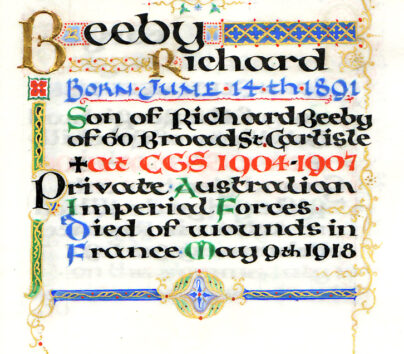When Richard joined up in May 1916 he was described as a railway porter. He was of average height, 5’7’’, fair, with blue eyes. His mother’s address was given as Aglionby Street, Carlisle, but was later amended to Harrow. On the form he said he had previously been in the army. This is possibly borne out by a letter from an Australian, R Beeby to the Cumberland News published on October 9 1915 saying he was a “Carlisle man” looking for pals in the North. He said he was in the Dardanelles for 15 weeks and had been in King George’s Hospital for 8 weeks “with a piece of bomb in the eye and concussion”. He says he has been in Australia for 6 years so It is unclear how the 1913 passage fits in with this. Having joined up again in 1916, he left Sydney in September 1916 aboard the “Euripides”, travelling to England before being posted to France. He had some trouble adjusting to soldiering it seems. He went AWOL for 3 days in January 1917. He lost 10 days’ pay and received 168 hours detention. Yet in March he again missed a day’s training. Richard was wounded in May and was hospitalised in France and was then transferred to hospital in England for a month. On the casualty form he was listed as a Gunner in the 1st battalion light trench mortar battery. In February 1918 in France he was in trouble again, being reprimanded for being improperly dressed, and in town without a pass. He was wounded in action in May and died at a casualty clearing station of his wounds. The Cumberland News in 1918 reported that on the outbreak of war he joined the expeditionary force and was sent to New Guinea and then returned to Sydney before going back to the front. He was buried at Ebblinghem. His effects, which included a fountain pen and a set of pocket chess, were sent to his mother.

